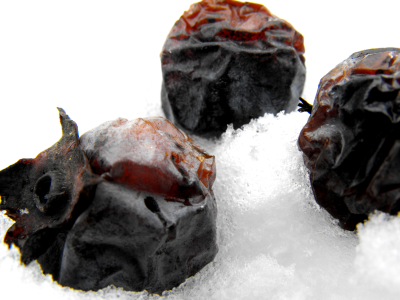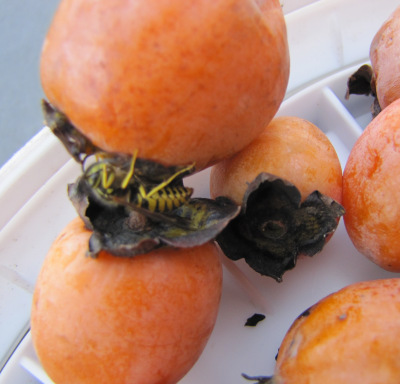
Persimmons in permaculture
 Back
when every
yard in the Deep South had a hog butchering station, ordinary farmers used to
practice permaculture. They planted persimmons in their pastures
to feed their pigs, cows, and horses, and the smartest farmers
hand-picked persimmon varieties so that they ripened continuously from
August to February. Since no livestock --- even goats and sheep
--- like the leaves, persimmons can be planted directly into pastures
with no protection. Can you imagine seven months of free
livestock feed growing on your hillside?
Back
when every
yard in the Deep South had a hog butchering station, ordinary farmers used to
practice permaculture. They planted persimmons in their pastures
to feed their pigs, cows, and horses, and the smartest farmers
hand-picked persimmon varieties so that they ripened continuously from
August to February. Since no livestock --- even goats and sheep
--- like the leaves, persimmons can be planted directly into pastures
with no protection. Can you imagine seven months of free
livestock feed growing on your hillside?
As always, I'm looking
for plants to include in our chickens'
forest pasture, and
I think persimmons might be a good addition. The downside of
persimmons, in my opinion, is that the fruits are nearly completely
sugar, with only about 3% protein by dry weight. However, my
experience with sugary fruits lying on the ground is that they attract  nearly their own weight in
insects, a chicken's favorite food. Even in the winter, insects
seem to show up if they've got something to eat, and fresh food of any
sort is highly appreciated by my flock during the cold season.
nearly their own weight in
insects, a chicken's favorite food. Even in the winter, insects
seem to show up if they've got something to eat, and fresh food of any
sort is highly appreciated by my flock during the cold season.
This week's lunchtime
series highlights the most interesting and useful facts about
persimmons, drawn out of Tree
Crops: A Permanent Agriculture, by J. Russell Smith, Organic
Orcharding: A Grove of Trees to Live In, by Gene Logsdon, and Two Promising Fruit Plants for Northern
Landscapes,
by E. Goodell (the last of which you can download by clicking on the
link.) It's amazing what delicious reading material turns up when
I take the time to go through my bookcase!
| This post is part of our Persimmons lunchtime series.
Read all of the entries: |
Want more in-depth information? Browse through our books.
Or explore more posts by date or by subject.
About us: Anna Hess and Mark Hamilton spent over a decade living self-sufficiently in the mountains of Virginia before moving north to start over from scratch in the foothills of Ohio. They've experimented with permaculture, no-till gardening, trailersteading, home-based microbusinesses and much more, writing about their adventures in both blogs and books.
Want to be notified when new comments are posted on this page? Click on the RSS button after you add a comment to subscribe to the comment feed, or simply check the box beside "email replies to me" while writing your comment.

Any chance you'd mail me a dozen seeds or so from your productive tree? I'm on the search for long-producing varieties! Email me (anna@kitenet.net) if you're interested.
I'll bet ants would make a tasty, high protein snack for my chickens...
Good morning,
In November 2015, I bought a crate of Persimmons and was very surprised to find a large oblong black seed inside one of the Persimmons. To make my story short, I planted it and it now has 4 leaves on it. I was now going to transplant it into a larger pot. Good idea? Any idea what the name of this Persimmon would be?
I live in Montreal, Quebec and wanted to know if our weather here (summer- winter) will allow my to plant my Persimmon outside? How long should I kept it growing indoors in the pot before considering planting it outside? Also, if anyone has done extra seeds that they are willing to send me, that would be great.
Thanking you in advance
David --- I'm assuming you bought Asian persimmons? I've been gifted a few seeds from usually seedless Asian persimmons, and I wasn't able to get any to sprout, so you're doing well!
Unfortunately, I doubt the tree will survive outside in Montreal. I bought two of the most cold hardy varieties of Asian persimmons, and they still die back to the ground most years here in zone 6. I'm assuming you're colder than us, so that's likely a no-go for you.